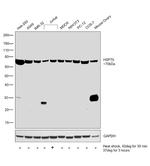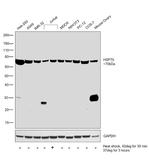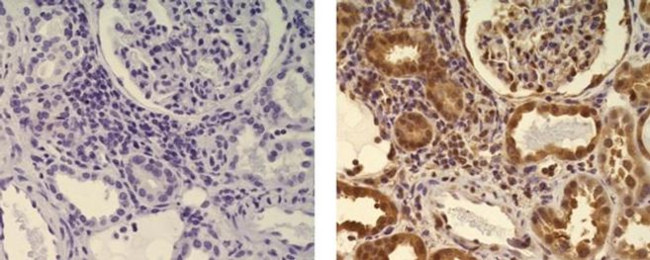Search Thermo Fisher Scientific
Invitrogen
HSP70 Monoclonal Antibody (1B2hsp70), eBioscience™
This Antibody was verified by Cell treatment to ensure that the antibody binds to the antigen stated.
FIGURE: 1 / 3
HSP70 Antibody (14-9115-37) in IHC (P)



Product Details
14-9115-37
Species Reactivity
Host/Isotype
Class
Type
Clone
Conjugate
Form
Concentration
Purification
Storage buffer
Contains
Storage conditions
Shipping conditions
RRID
Product Specific Information
Description: The monoclonal antibody 1B2hsp70 recognizes HSP (heat shock protein) 70. Hsps are highly conserved molecular chaperones that associate with proteins to stabilize or aid in the folding of new proteins or denatured proteins following chemical or physical stress. Hsp expression is both constitutive and inducible depending on the cell and its surrounding conditions. Hsps have been known to be upregulated in conditions such as cancer, ischemic injury, inflammatory, and demyelinating disease.
This antibody recognizes the Hsp70 family member 1A found in the cytoplasm and nucleus of numerous cell types. Given the high degree of conservation of this protein across species, the 1B2hsp70 clone is expected to recognize canine and monkey HSP70 1a.
Applications Reported: This 1B2hsp70 antibody has been reported for use in western blotting, immunohistochemical staining of formalin-fixed paraffin embedded tissue sections, and microscopy.
Applications Tested: This 1B2hsp70 antibody has been tested by immunohistochemistry on formalin-fixed paraffin embedded tissue using both low and high pH antigen retrieval at less than or equal to 5 µg/mL. It is recommended that the antibody be carefully titrated for optimal performance in the assay of interest.
Purity: Greater than 90%, as determined by SDS-PAGE.
Aggregation: Less than 10%, as determined by HPLC.
Filtration: 0.2 µm post-manufacturing filtered.
Target Information
HSP70 is a Heat shock protein (HSP) which are expressed in response to various biological stresses, including high temperatures. There are several major families of HSPs that include HSP70, there are HSP90 and HSP100. The HSP70 family is a set of highly conserved proteins that are induced by a variety of biological stresses, including heat stress, in every organism in which the proteins have been examined. The human HSP70 family members include: HSP70, a protein which is strongly inducible in all organisms but which is also constitutively expressed in primate cells; HSP72, a 72 kDa protein that is induced exclusively under stress conditions; HSC70, or cognate protein, is a 72 kDa, constitutively expressed, protein which is involved in the uncoating of clathrin coated vesicles; GRP78, or BiP, is a glucose regulated 78 kDa protein localized in the endoplasmic reticulum; and p75, or HSP75, a 75 kDa protein that is found within the mitochondria. Further, HSP70 is encoded by an intronless gene and, in conjunction with other heat shock proteins, HSP70 stabilizes existing proteins against aggregation and mediates the folding of newly translated proteins in the cytosol and organelles. HSP70 is also involved in the ubiquitin-proteasome pathway through interaction with the AU-rich element RNA-binding protein 1. The HSP70 gene is located in the major histocompatibility complex class III region, in a cluster with two closely related genes which encode similar proteins.
For Research Use Only. Not for use in diagnostic procedures. Not for resale without express authorization.
References (0)
Bioinformatics
Protein Aliases: 70 kilodalton heat shock protein; dnaK-type molecular chaperone HSP70-1; epididymis secretory protein Li 103; epididymis secretory sperm binding protein Li 5a; heat shock 10kDa protein 1-like; Heat shock 70 kDa protein 1; Heat shock 70 kDa protein 1-Hom; Heat shock 70 kDa protein 1-like; heat shock 70 kDa protein 1/2; Heat shock 70 kDa protein 1A; heat shock 70 kDa protein 1A/1B; Heat shock 70 kDa protein 1B; Heat shock 70 kDa protein 1L; Heat shock 70 kDa protein 2; Heat shock 70 kDa protein 4; Heat shock 70-related protein APG-2; heat shock 70kD protein 1A; heat shock 70kD protein 1B; heat shock 70kD protein 2; heat shock 70kD protein 4; heat shock 70kD protein-like 1; heat shock 70kDa protein 1-like; heat shock 70kDa protein 1A; heat shock 70kDa protein 1B; heat shock 70kDa protein 2; heat shock 70kDa protein 4; Heat shock protein; heat shock protein Apg-2; Heat shock protein family A member 1A; Heat shock protein family A member 1B; Heat shock protein family A member 1L; Heat shock protein family A member 2; Heat shock protein family H member 2; heat shock protein, 110 kDa; heat shock-induced protein; Heat shock-related 70 kDa protein 2; HEL S 103; HSP; HSP70 1; HSP70 1B; HSP70 2; HSP70 AceyltK77; hsp70 RY; HSP70-1; HSP70-1/HSP70-2; HSP70-2; HSP70-Hom; HSP70.1/HSP70.2; HSP70RY; HSPA2; HSPA4; Hspa70
Gene Aliases: APG-2; APG2; HEL-S-103; HEL-S-5a; HS24/P52; Hsp70; HSP70-1; HSP70-1A; HSP70-1B; HSP70-1L; HSP70-2; HSP70-3; HSP70-HOM; HSP70.1; HSP70.2; HSP70I; hsp70RY; HSP70T; HSP72; HSPA1; HSPA1A; HSPA1B; HSPA1L; HSPA2; HSPA4; HSPH2; HSX70; hum70t; RY
UniProt ID: (Dog) Q7YQC6, (Human) P0DMV8, (Human) P34931, (Human) P54652, (Dog) Q2TFN9, (Human) P34932
Entrez Gene ID: (Dog) 403612, (Human) 3303, (Human) 3304, (Human) 3305, (Human) 3306, (Dog) 480355, (Dog) 474680, (Human) 3308

Performance Guarantee
If an Invitrogen™ antibody doesn't perform as described on our website or datasheet,we'll replace the product at no cost to you, or provide you with a credit for a future purchase.*
Learn more
We're here to help
Get expert recommendations for common problems or connect directly with an on staff expert for technical assistance related to applications, equipment and general product use.
Contact tech support
